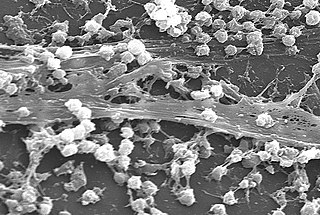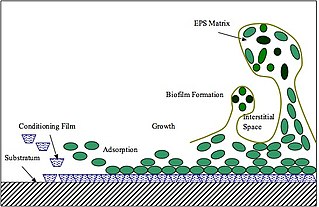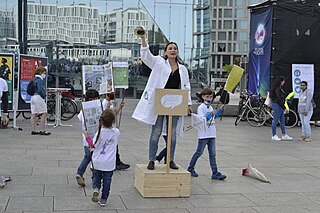
A biofilm is a syntrophic community of microorganisms in which cells stick to each other and often also to a surface. These adherent cells become embedded within a slimy extracellular matrix that is composed of extracellular polymeric substances (EPSs). The cells within the biofilm produce the EPS components, which are typically a polymeric combination of extracellular polysaccharides, proteins, lipids and DNA. Because they have a three-dimensional structure and represent a community lifestyle for microorganisms, they have been metaphorically described as "cities for microbes".

Extracellular polymeric substances (EPSs) are natural polymers of high molecular weight secreted by microorganisms into their environment. EPSs establish the functional and structural integrity of biofilms, and are considered the fundamental component that determines the physicochemical properties of a biofilm. EPS in the matrix of biofilms provides compositional support and protection of microbial communities from the harsh environments. Components of EPS can be of different classes of polysaccharides, lipids, nucleic acids, proteins, lipopolysaccharides, and minerals. This chemical formula is (C135H217N15Na2O74P10).
The International Society for Microbial Ecology (ISME) is the principal scientific society for the burgeoning field of microbial ecology and its related disciplines. ISME is a non-profit association and is owner of the International Symposia on Microbial Ecology and also owner of The ISME Journal which is published by Springer Nature. The ISME Office is based at the Netherlands Institute of Ecology in Wageningen, The Netherlands.
Ultramicrobacteria are bacteria that are smaller than 0.1 μm3 under all growth conditions. This term was coined in 1981, describing cocci in seawater that were less than 0.3 μm in diameter. Ultramicrobacteria have also been recovered from soil and appear to be a mixture of Gram-positive, Gram-negative and cell-wall-lacking species. Ultramicrobacteria possess a relatively high surface-area-to-volume ratio due to their small size, which aids in growth under oligotrophic conditions. The relatively small size of ultramicrobacteria also enables parasitism of larger organisms; some ultramicrobacteria have been observed to be obligate or facultative parasites of various eukaryotes and prokaryotes. One factor allowing ultramicrobacteria to achieve their small size seems to be genome minimization such as in the case of the ultramicrobacterium P. ubique whose small 1.3 Mb genome is seemingly devoid of extraneous genetic elements like non-coding DNA, transposons, extrachromosomal elements etc. However, genomic data from ultramicrobacteria is lacking since the study of ultramicrobacteria, like many other prokaryotes, is hindered by difficulties in cultivating them.

Patricia Hannah Clarke FRS was a British biochemist.
Roberto Kolter is Professor of Microbiology, Emeritus at Harvard Medical School, an author, and past president of the American Society for Microbiology. Kolter has been a professor at Harvard Medical School since 1983 and was Co-director of Harvard's Microbial Sciences Initiative from 2003-2018. During the 35-year term of the Kolter laboratory from 1983 to 2018, more than 130 graduate student and postdoctoral trainees explored an eclectic mix of topics gravitating around the study of microbes. Kolter is a fellow of the American Association for the Advancement of Science and of the American Academy of Microbiology.

The Center for Biofilm Engineering (CBE) is an interdisciplinary research, education, and technology transfer institution located on the central campus of Montana State University in Bozeman, Montana. The center was founded in April 1990 as the Center for Interfacial Microbial Process Engineering with a grant from the Engineering Research Centers (ERC) program of the National Science Foundation (NSF). The CBE integrates faculty from multiple university departments to lead multidisciplinary research teams—including graduate and undergraduate students—to advance fundamental biofilm knowledge, develop beneficial uses for microbial biofilms, and find solutions to industrially relevant biofilm problems. The center tackles biofilm issues including chronic wounds, bioremediation, and microbial corrosion through cross-disciplinary research and education among engineers, microbiologists and industry.
Barbara Hotham Iglewski was an American microbiologist. She was director of international programs at the University of Rochester Medical Center where she was a professor of microbiology and immunology.

Bruce E. Rittmann is Regents' Professor of Environmental Engineering and Director of the Swette Center for Environmental Biotechnology at the Biodesign Institute of Arizona State University. He was also elected a member of the National Academy of Engineering in 2004 for pioneering the development of biofilm fundamentals and contributing to their widespread use in the cleanup of contaminated waters, soils, and ecosystems.

Karen Margaret Holford is a Welsh engineer, Professor of Mechanical Engineering and Vice-Chancellor and Chief Executive of Cranfield University. She was formerly Deputy Vice-Chancellor at Cardiff University. She is also a former Pro Vice-Chancellor of the College of Physical Sciences and Engineering and Head of the School of Engineering. She is an active researcher of acoustic emission and her work has been applied to damage assessment inspections on industrial components.
Gabriele Berg is a biologist, biotechnologist and university lecturer in Environmental and Ecological Technology at the Technical University of Graz. Her research emphasis is on the development of sustainable methods of plant vitalisation with Bioeffectors and molecular analysis of microbial processes in the soil, particularly in the Rhizosphere.

Oded Béjà is a professor in the Technion-Israel Institute of Technology, in the field of marine microbiology and metagenomics.
Kornelia Smalla is a chemist and biotechnologist at the Julius Kuehn Institute (JKI) in Braunschweig and a university lecturer in microbiology at the Technical University of Braunschweig.
Diane Kelly is a Professor of Microbiology, Institute of Life Science, Swansea University Medical School and Fellow of the Learned Society of Wales.

Soapbox Science is a public outreach platform that promotes women working in science and the research that they do. The events turns public spaces into an area for learning and debate, in the spirit of Hyde Park's Speakers' Corner. Soapbox Science encourages scientists to explain their research to members of the public using non-traditional methods. Speakers typically make props at home to explain the processes behind their research.

Emma Yhnell is a British scientist, science communicator and senior lecturer based at Cardiff University. She has previously conducted research on computerised cognitive training and Huntington's disease. An advocate for public engagement and science communication, and a STEM ambassador, Yhnell won the British Science Association's Charles Darwin Award Lecture for Agricultural, Biological and Medical Sciences and the British Neuroscience Association's Public Engagement Award.
Yamni NigamFRES is a professor and scientist at Swansea University. Her scientific research focuses on the immune system of insects and invertebrates. She has a particular interest in wound healing and maggot (larval) therapy. Nigam additionally lectures on anatomy, physiology and pathophysiology within the School of Health & Social Care in the Faculty of Medicine, Health & Life - science at Swansea University.
The European Academy of Microbiology, generally abbreviated as EAM, is a European institution made up of about 150 microbiology scientists, founded in 2009.
Kristen M. DeAngelis is a professor in the department of Microbiology at the University of Massachusetts where she studies soil microbes in relation to climate change.
John William Fisher "Bill" Costerton was a Canadian microbiologist and the main pioneer of the paradigm of microbial life as a community of microorganisms attached to hydrated surfaces by means of biofilms. He is sometimes referred to as the "Father of Biofilms" or the "King of Slime".









